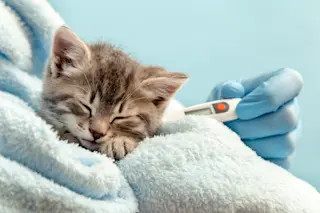If you feel like something is wrong — say, your stomach or your leg is hurting — you can typically explain to others what’s going on. Maybe you tell a doctor what your symptoms are and what your pain level is, while adding other information to aid the practitioner’s understanding.
But cats can’t tell us how they’re feeling.
Whatever their ailment, what are some signs that might help us understand our feline friends better and to know if something is wrong? Read on to learn what to look for when something is wrong with your cat — and what to do about it.
Not only do our feline friends communicate differently than us humans, but “cats are both predator and prey, and so they do a lot of hiding their injuries in their illness behaviors,” says M. Leanne Lilly, a clinical assistant professor at the Ohio State University Veterinary Medical ...















